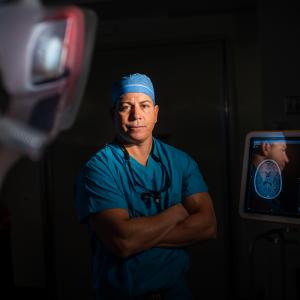
Photo: Juliana Thomas
Over the last five years, Perlmutter Cancer Center’s Clinical Trials Office (CTO) has tripled in size. With shortened opening times, expanded biobanking, a budding phase I clinical trials drug development program, new metric-tracking tools, and increased patient accrual across a growing clinical network, the CTO team has steadily grown and strengthened its relationships with pharmaceutical and biotech companies— solidifying the center’s status as a go-to site for cancer research trials.
Tracking Efficiency with Enhanced Metrics
With a formalized process for tracking metrics, the reorganized CTO is relying on new, more advanced tracking tools and data management systems. Many of these were developed in-house at NYU Langone to streamline the review and approval process and assist investigators in managing data and meeting reporting requirements once trials are activated.
The CTO can now provide trial sponsors with quantitative metrics demonstrating that NYU Langone’s program operates with extreme efficiency. “We now get our studies activated within 100 days. We’ve lowered the number of deviations, we’re running studies with higher acuity and complexity, and we’ve significantly increased accrual rates,” says Deirdre J. Cohen, MD, associate professor of medicine and medical director of the CTO.
“We’ve lowered the number of deviations, we’re running studies with higher acuity and complexity, and we’ve significantly increased our clinical trial accrual rates.”—Deirdre J. Cohen, MD
The phase I cancer clinical trials program has been particularly successful at enrolling patients, thanks to an operational culture that encourages collaboration. “Where many centers are more siloed with only a select number of investigators participating in trials, here we run a very open program where just about every investigator can be on our protocols,” explains Daniel C. Cho, MD, assistant professor and director of the rapidly expanding phase I drug development program. “Downstream, this openness leads to robust patient accrual, a key metric for drawing in more trials.”
Expanding to Satellite Sites
That collaborative culture is now extending to investigators at NYU Winthrop Hospital, an affiliate of NYU Langone Health, all of whom have been assigned to Disease Management Groups at Perlmutter Cancer Center; going forward, they will be part of the vetting process for all new trials under consideration. “With representatives from NYU Winthrop in each group, we can determine early on if a trial suits their patient population, as well as ours, or competes with existing studies,” says Dr. Cohen.
A pilot program will start with five clinical trials conducted at both locations. With expansion to NYU Winthrop as the first phase, the center is also working to extend trials to NYU Langone Hospital—Brooklyn and other network sites. An earlier initiative aimed at increasing clinical trial access for the patient population at NYC Health + Hospitals/Bellevue, where NYU Langone Health has an academic affiliation, resulted in a fivefold accrual increase in the past year. “We want to mimic that model at NYU Winthrop and future sites,” notes Dr. Cohen.
Growing the Trials Portfolio
High-growth program areas include studies and phase I drug trials initiated by Perlmutter Cancer Center, and that momentum is feeding opportunity throughout the center. “This past year has seen the launch of several trials originated by investigators at the cancer center, and the phase I program—launched within the past five years—became our fastest-growing trial unit at the center,” says Dr. Cohen.
In one ongoing trial, Mohammad Maher Abdul Hay, MD, assistant professor of medicine at NYU Langone and associate director for research at Bellevue's Cancer Center, is currently recruiting patients with myelodysplastic syndromes (MDS) for research stemming from preclinical work conducted by Benjamin G. Neel, MD, PhD, professor of medicine and director of the Perlmutter Cancer Center and Iannis Aifantis, PhD, professor of pathology and chair of the Department of Pathology. Through their research, Dr. Neel and Dr. Aifantis showed that in TET2-deficient mice, high-dose vitamin C restored TET2 function, induced stem cells to mature into healthy blood cells, and suppressed leukemia stem cell growth. The findings, published in August 2017 in Cell, suggest that high-dose vitamin C might effectively treat blood diseases caused by TET2-deficient leukemia stem cells, most likely in combination with other targeted therapies.
In light of these laboratory studies, Dr. Hay launched an open label phase Ib/IIa study to evaluate the safety and biological activity of intravenous vitamin C infusions in patients with MDS who are at intermediate or high risk of acute myeloid leukemia and also have a mutation in the TET2 gene, found in 30 percent of patients with MDS. This is the first Food and Drug Administration–approved clinical trial to use a continuous vitamin C infusion, a potentially promising therapy for a condition with extremely low median survival.
More Firsts on the Horizon
Across Perlmutter Cancer Center, disease groups are expanding their trials portfolio. Among the many other notable studies currently underway: the first in-human trial of a targeted therapy for advanced non-small cell lung cancer, a phase II study for locally advanced pancreatic cancer, and a precision oncology phase Ib trial for patients with metastatic colorectal cancer.
Meanwhile, successful results from multinational trials designed and conducted by Sylvia Adams, MD, associate professor of medicine and director of clinical research, suggest that an immunotherapy–chemotherapy combination may be effective as a first-line therapy for women with advanced triple-negative breast cancer. This trial is poised to be the seventh practice-changing piece of research at Perlmutter Cancer Center in the past six years.

